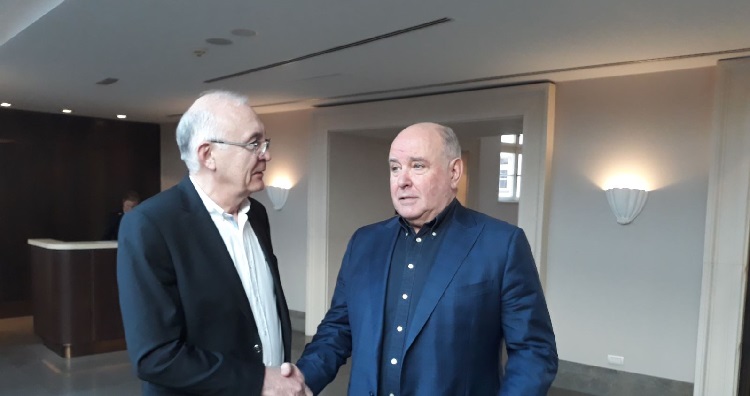Georgian envoy denies discussing June 2019 protests with Russia’s Karasin, calls it ‘Russia’s interpretation’

Informal trade and economic talks between Georgian PM’s special representative for relations with Russia Zurab Abashidze and former Russian Deputy Foreign Minister Grigory Karasin were launched in 2012. Photo: Georgian SErvice of RFE/RL
Georgian PM’s special representative for relations with Russia Zurab Abashidze, who held an online meeting with former Russian Deputy Foreign Minister Grigory Karasin yesterday, said unlike the Russian FM’s statement, the anti-Russia protests of 2019 were not mentioned during their conversation.
In its official statement following the informal trade and economic talks between Abashidze and Karasin, Russian foreign ministry announced that the parties have confirmed the mutual willingness to ‘overcome the negative consequences of the well-known anti-Russian provocation staged by Georgian nationalists in the summer of 2019’.
We hope that the Russophobic rhetoric actively used by radical circles during the election campaign will remain in the past, and that the political forces that have won the parliamentary elections will use the mandate of voters' trust which they have received to help continue the process of normalisation of bilateral relations”, the Russian foreign ministry statement reads.
Claiming that the developments of 2019 were not at all included in their agenda, Zurab Abashidze said this is Russia’s interpretation. Meanwhile in his earlier statement he noted that during the online meeting he spoke of the situation in Russia-occupied Georgian regions of Abkhazia and Tskhinvali (South Ossetia).
Despite the pandemic, the Russian Federation continues large-scale military training and the process of so-called 'borderisation' along the occupation lines which blatantly violate human rights on the ground and practically terminating the connectivity with the [occupied] regions”, Abashidze said.
He also added that the recently approved program for creating a unified social and economic space between Russia and occupied Abkhazia was also denounced as ‘yet another illegal step toward de-facto annexation’.
Calling Georgia’s claims on ‘borderisation’ and ‘illegal detention’ of Georgian citizens ‘groundless accusations', the Russian foreign ministry statement says they only ensure security on the ground and instead called on Georgia ‘to stop provocations’ along the occupation line.
????????????????В рамках действующего российско-грузинского неформального диалогового механизма сенатор Г.Б.Карасин провел встречу ???? в формате видеоконференцсвязи со специальным представителем Премьер-министра Грузии З.Абашидзе.???? https://t.co/aePRryjgYk #Россия #Грузия pic.twitter.com/iSPO5eG0yX
— МИД России ???????? (@MID_RF) November 27, 2020
It underscores as well that despite the political tension between the two countries and the current coronavirus pandemic, Russia remains the second largest trade partner for Georgia and one of the main importers of Georgian wine.
Based on the statement, part from the current epidemiological threats in both countries, Russia would consider the restoration of direct flights to Georgia if the latter stopped ‘anti-Russian manifestations’ and avoids ‘security threats against Russian citizens’.
The Abashidze-Karasin meetings represent the only direct format of communication since the two countries suspended diplomatic ties in 2008 after the Russia-Georgia war.
However, the informal dialogue is mainly aimed to discuss trade and economic relations between Georgia and Russia, while the human rights and security situation in occupied Abkhazia and Tskhinvali are usually being discussed at the Geneva International Discussions.
 Tweet
Tweet  Share
Share